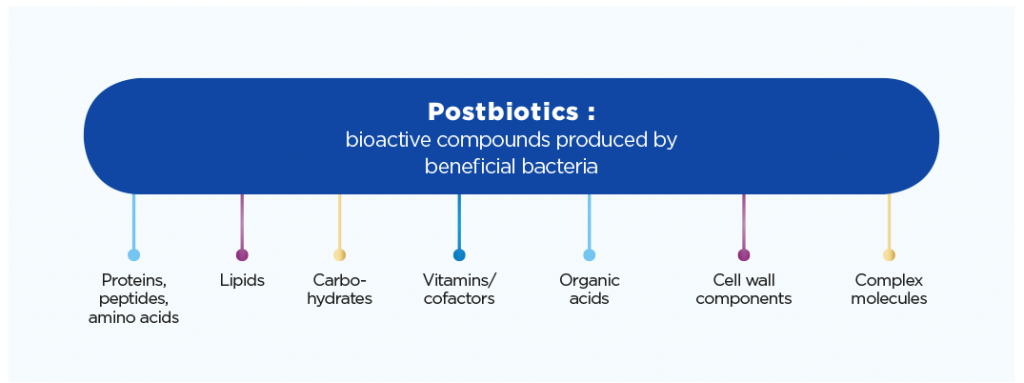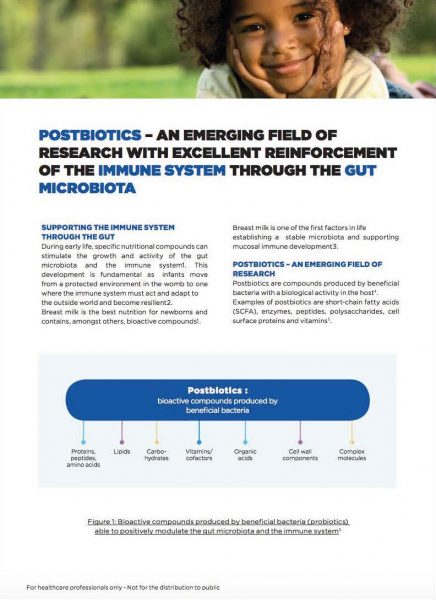Researchers believe that the effects of postbiotics can be both local and systemic, affecting different organs and systems.
Postbiotics are bioactive compounds produced by food-grade micro-organisms in a fermentation process1. During fermentation, bacteria metabolize food and produce various bacterial compounds and metabolites. Each bacterial strain used during specific fermentation processes produce unique postbiotics. Therefore, postbiotics from other bacterial strains or produced with another fermentation process cannot be compared.
Examples of postbiotics are short-chain fatty acids (SCFA), enzymes, peptides, polysaccharides, cell surface proteins and vitamins (see figure 1)1.

There is increasing interest in postbiotics due to the wide-ranging potential benefits they have for human health. It is anticipated that the effects of postbiotics can be both local as well as systemic, affecting different organs and systems. For example, different postbiotic compounds have been shown to have anti-inflammatory, antimicrobial and immunomodulatory properties1.
Clinical studies
Moreover, in various pre-clinical trials, specific postbiotic compounds have been shown to positively impact gut microbiota composition, intestinal barrier function and the innate and adaptive immune system1,3.

In clinical studies, there is accumulating evidence showing that infant formula with postbiotics – especially derived from B. breve C50 and S. thermophilus 065 – provide gut and immune benefits, including:
- Modulation of the gut microbiota with higher proportion of bifidobacteria and with fewer adult-like species4
- Increased poliovirus-specific intestinal antibody response2,4
- Less severe diarrhea2
- Similar thymus indexes as human milk-fed infants5
These results show that infant formulas with postbiotics have an excellent potential to reinforce the immune system through the gut2,4,5.

Infographic: The benefits of postbiotics
References
- Aguilar-Toalá, J. E., et al. “Postbiotics: An evolving term within the functional foods field.” Trends in Food Science & Technology 75 (2018): 105-114.
- Martin, Rocio, et al. “Early life: gut microbiota and immune development in infancy.” Beneficial microbes 1.4 (2010): 367-382.
- Patel, Ravi Mangal, and Patricia Wei Denning. “Therapeutic use of prebiotics, probiotics, and postbiotics to prevent necrotizing enterocolitis: what is the current evidence?.” Clinics in perinatology 40.1 (2013): 11-25.
- Mullié, Catherine, et al. “Increased poliovirus-specific intestinal antibody response coincides with promotion of Bifidobacterium longum-infantis and Bifidobacterium breve in infants: a randomized, double-blind, placebo-controlled trial.” Pediatric research 56.5 (2004): 791.
- Indrio, Flavia, et al. “Effect of a fermented formula on thymus size and stool pH in healthy term infants.” Pediatric research 62.1 (2007): 98.
BA19-485
